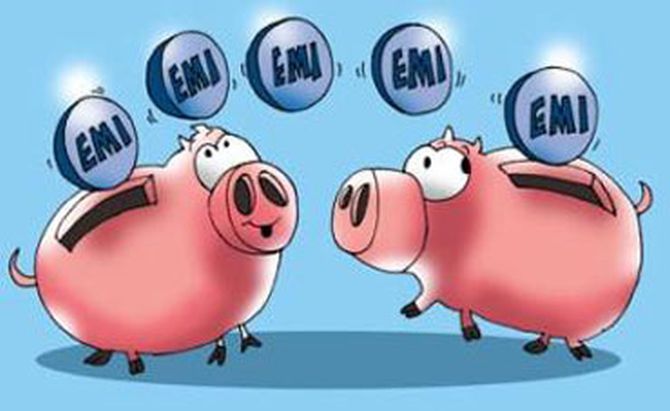If your are hassled with too many EMIs, bring them all under one umbrella and make a single payment
Illustration: Uttam Ghosh/Rediff.com

Debt is an important part of managing your personal finance as it works as a leveraging tool to increase your financial capacity.
However, there are many occasions for which you may need a bank loan and it could result in multiple loans piling up over a period of time.
It could be a difficult task to handle many loans at a time and it may impact your credit score negatively in the long term.
Check out these warning signs and figure out if it’s time to consolidate your loans to streamline your finances better:
Repercussions of having multiple loans
When you handle too many loan instruments all at the same time, then there is a great chance that you may miss the repayment of one or more debt instruments.
It could also result in a negative impact on your credit score.
Irrespective of whether you have defaulted in making payment for a home loan or a credit card, a default is seen as a black spot.
It also becomes difficult to set priority on which loan you should close first and which one you should carry for a longer period.
As it’s almost impossible to assess the impact of change in the interest rates, it’s always better to keep the number of debt instruments to a manageable level.
Thus debt consolidation is a very good way to cut number of loans by combining all the existing debts into one and focus on a single loan repayment.
How does debt consolidation work?
One way to execute debt consolidation is to convert all your secured and unsecured debts into a single secured loan such as a loan against property (LAP), loan against securities, loan against FD or LIC policy.
Such consolidated secured loans have normally very low interest rate and you also get a longer tenure to repay the secured loan.
Another way to consolidate all your loans is by taking an unsecured loan such as a personal loan.
But remember that unsecured loans generally have high interest rates.
Moreover, considering that you already have several existing loans, in such situations it could be a difficult task for you to get a big unsecured loan.
When you apply for a debt consolidation loan to a bank/FIs, it will first assess your existing loan history and CIBIL score.
Banks would check whether you are financially capable to service the consolidated EMIs or not and it may thereafter advice you to go for a secured loan or an unsecured loan.
If you do manage to secure the loan after these checks, make sure you use the amount to pay off all your pending loans, so that you can focus on one single EMI.
How to prepare for debt consolidation?
- Before you apply for a debt consolidation loan, you need to prepare yourself for it. Here are some essentials you need to follow:
- Make a list of all your existing loans
- Check the penalty that you may need to pay for closing an existing loan
Now let’s see how to analyse the amount that you may save or need to pay extra due to debt consolidation with the help of an example as given in the table below:
|
Debt consolidation analysis |
|||||
|
Loan Detail |
Amount |
Interest |
Remaining tenure |
EMI |
Amount to be paid till end |
|
Loan A |
100000 |
10% |
3 |
3227 |
116162 |
|
Loan B |
150000 |
15% |
3 |
5200 |
187193 |
|
Loan C |
200000 |
14% |
3 |
6836 |
246079 |
|
Loan D |
500000 |
10% |
3 |
16134 |
580809 |
|
Loan E |
600000 |
9% |
3 |
19080 |
686874 |
|
Total |
1550000 |
|
|
50477 |
1817117 |
|
CASE-I-Consolidate loan@10% |
1550000 |
10% |
3 |
50014 |
1800509 |
|
CASE-II- Consolidate loan@11% |
1550000 |
11% |
3 |
50745 |
1826820 |
|
*Remaining tenure is assumed to be same |
|||||
After consolidating all the loans, if you do not need to pay a significant extra amount in comparison to the amount you need to pay under multiple loans, then you should go ahead with the consolidation option.
Benefits of debt consolidation
There are many benefits of debt consolidation.
First, you get the chance of lowering the EMI that you collectively pay for different existing loans.
Secondly, by consolidating loans, you can lower the interest rate under a single new loan and hence save lot of money.
It can also help to keep your credit score in good shape.
Most importantly, stay stress free from managing too many loans.
Already the interest rate on loans are very low in the prevailing market situation which can help you to consolidate all your loans into one and reduce the interest load.
Adhil Shetty is CEO of Bankbazaar
BankBazaar.com is a marketplace where you can compare and apply online for loans to meet all your personal loan, home loan, car loan and credit card needs from India's leading banks and NBFCs.













 © 2025
© 2025